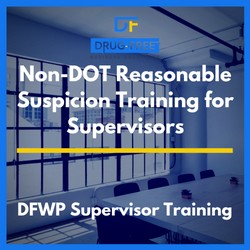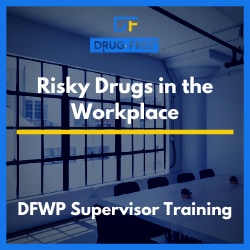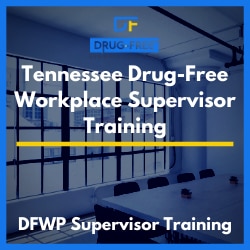A non-DOT drug test is a drug test administered under an employer’s authority. The Department of Transportation (DOT) provides the authority for a DOT drug test.
And the DOT uses a 5-panel drug test, while employers can choose any form of drug test. They can use a 10-panel or 12-panel if they want. It just depends on the employer’s preference. The 5-panel drug test screens for marijuana, alcohol, amphetamines, opiates (narcotics), and phencyclidine (PCP).
Companies that do not fall under the jurisdiction of the Department of Transportation use a non-DOT drug test. But because there is no authority setting regulations, a non-DOT drug test is actually quite broad. Employers have more choices on how they conduct drug tests compared to transportation companies. If your company is not in the transportation industry, then it will likely follow non-DOT drug test procedures, which by nature can be more varied.
The Four Non-DOT Drug Test Situations
This course gives supervisors an in-depth look at four common testing situations: job applicant, post-accident, post-rehabilitation, and routine fitness-for-duty testing.
How to Carry out Assigned Responsibilities for Job Applicant Drug Testing
Job applicant drug testing is also referred to as pre-employment drug testing.
We cover the assigned responsibilities for drug-free workplace supervisors in pre-employment drug testing, and we go over all the necessary procedures and methods for administering the test.
Understand and Carry Out Employer Policy for Post-Accident Drug Testing
Most employer policy dictates that post-accident drug testing should occur after a workplace accident.
We cover the employer policy, making sure you understand the most important aspects of post-accident testing.
Then we go through the steps involved in administering the post-accident drug test.
Explain and Follow Procedures for Post-Rehab and Fitness-For-Duty Drug and Alcohol Testing
Most employer drug and alcohol policy requires employees and supervisors returning to work after failing a drug test to take a post-rehab test.
We cover the necessary procedures in post-rehab testing.
When employers give employees or supervisors new and increased safety-sensitive duties, employers often require fitness-for-duty drug testing. With fitness-for-duty testing, employees and supervisors must confirm sobriety for their new role.
We also go over the steps you must take in the fitness-for-duty drug testing process.






